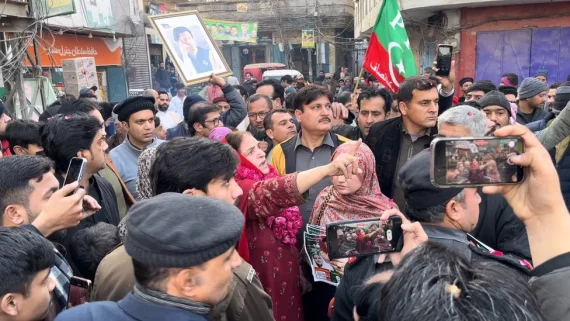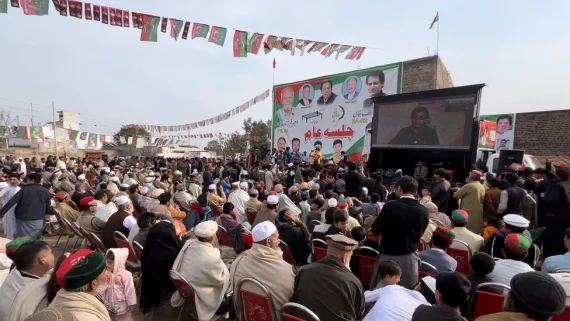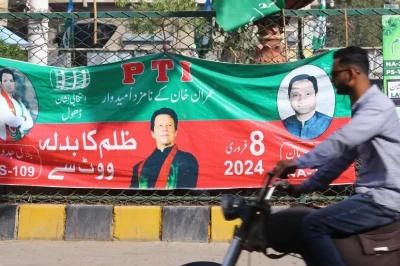In Pakistani politics’ complex and often tumultuous world, few figures command as much attention and controversy as Imran Khan. Once celebrated as a cricketing legend turned political savior, Khan now finds himself embroiled in legal battles and facing incarceration, all while his party, Pakistan Tehreek-e-Insaf (PTI), remains optimistic about its electoral prospects in the upcoming general elections. How can a party led by a leader behind bars still harbor hopes of victory?
Imran Khan, Pakistan’s former Prime Minister, and his wife, Bushra Khan, were each sentenced to 14 years in prison on Wednesday in connection with the illicit sale of state goods before the election.
An anti-graft court ruled a day after Khan was sentenced to ten years for disclosing state secrets. Imran Khan, the former prime minister of Pakistan, and his spouse, Bushra Khan, received a seven-year prison sentence along with a fine on Saturday in an Islamic marriage case.
Khan has been in prison since August and denies any involvement. The following details the top 150 cases he claims have been filed against him since his ouster from power in 2022.
The answer lies in history, where instances of leaders triumphing from jail cells offer valuable insights into the resilience of political movements. Throughout history, numerous figures have transformed their imprisonment into a platform for political mobilization, leveraging public sympathy and rallying support behind their cause.

Nelson Mandela’s 27 years in prison only served to galvanize the anti-apartheid movement, ultimately propelling him to the presidency of South Africa. Similarly, the resilience of leaders like India’s Indira Gandhi, who contested elections while facing legal troubles, showcases the ability of the masses to separate political performance from legal entanglements.
Closer to home, Pakistan has witnessed incarcerated leaders’ remarkable resilience. Benazir Bhutto, the first woman to lead a Muslim-majority nation, faced imprisonment multiple times during her political career. Yet, each stint in jail only seemed to strengthen her resolve and bolster her popularity among supporters. Bhutto’s ability to connect with the masses, even from confinement, played a crucial role in her electoral success.
Imran Khan’s party draws inspiration from these historical instances, relying on the public’s capacity to distinguish between personal matters and governance accomplishments.
Also Read: Ambassador Shozab Abbas advances Pakistan-Mexico Relations
However, amidst the tumult of legal proceedings and political turmoil, there emerges a fascinating narrative – Imran Khan’s party remains steadfast in its belief that it can triumph in the upcoming general elections, even with its founder languishing in jail. How is this possible? What sustains the support for a leader entangled in a web of controversies and legal woes?
To understand this phenomenon, we must delve into the psyche of Khan’s voter base. Contrary to conventional wisdom, it’s not merely blind allegiance or political fanaticism that propels their unwavering support. Instead, it’s deeply rooted in tangible benefits and a sense of empowerment derived from Khan’s governance.
His voter base remains firmly rooted in segments of society that have directly benefited from his policies. Khan’s tenure as Prime Minister witnessed the implementation of transformative initiatives aimed at uplifting the marginalized segments of society.
The introduction of initiatives such as the Insaf Health Card. Khan won the hearts of millions of Pakistanis, especially those from marginalized areas, with initiatives such as the Insaf Health Card, which gave free medical treatment for up to 10 lac rupees per year, the Ehsaas program, and financial support during the COVID-19 pandemic. For many, Khan represents hope, a leader prioritizing their well-being over political expediency.
Ehsaas Program and Ehsaas Panagah (shelter homes) have impacted millions by providing healthcare, social welfare, and support to vulnerable, underprivileged communities. The Ehsaas Program, formerly known as the Benazir Income Support Program (BISP), was a social safety net and poverty reduction program initiated by the Khan government.
Panagah was an essential program for the former Prime Minister. Panagahs offered daily wage people with not only shelter but also two meals every day. Furthermore, providing 12,000 rupees in financial help during the COVID-19 pandemic was a lifeline for individuals facing unemployment and economic difficulty.
Beyond these flagship programs, Khan’s appeal extends to diverse constituents, including former prisoners and their families. The release of prisoners from Saudi Arabia during King Salman bin Al Saud’s visit to Pakistan underscores Khan’s diplomatic prowess and commitment to safeguarding Pakistani citizens’ interests, both at home and abroad.

Furthermore, Khan’s emphasis on accountability and anti-corruption resonates strongly with a populace disillusioned by decades of graft and cronyism. Despite the legal challenges he faces, many view Khan as a martyr for his crusade against entrenched corruption, standing up against powerful vested interests.
Crucially, the narrative of victimhood can be a potent political tool. By portraying himself as a victim of persecution orchestrated by the foreign interference, Khan taps into a deep-seated distrust of the status quo among sections of the population. In doing so, he fosters a sense of solidarity among his supporters, painting himself as a lone warrior fighting against entrenched elites.
Of course, the road ahead is fraught with challenges. Winning an election from a jail cell is no easy feat, and PTI’s electoral fortunes may hinge on many factors beyond Khan’s personal popularity. Yet, history reminds us that political landscapes can shift rapidly, and leaders’ resilience and movements should always be considered.
Ultimately, the story of Imran Khan and PTI is not just about one man’s quest for power but a testament to the enduring power of grassroots movements and the unwavering support of those who believe in the promise of change. As Pakistan prepares for another electoral showdown, the legacy of leaders who defied the odds serves as a reminder that in politics, as in life, nothing is impossible.
By drawing upon the lessons of history, Khan and his supporters remain undeterred in their belief that victory is within reach, even in the most challenging circumstances. Whether they succeed or not, only time will tell. But one thing is sure: the spirit of resilience that defines Pakistan’s political landscape will continue to shape its future, regardless of who sits in the corridors of power.
International Relations Scholar interested in National Security strategies, with a good focus on Geo-Politics, Foreign Policy, and Public & Cultural Diplomacy.







